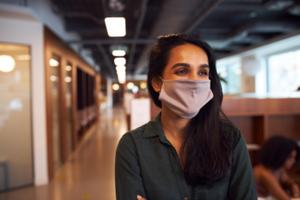 Today’s guest blogger is Gloria Oliveras-Bravo of Barbachano International in San Diego, California (USA). Barbachano International is the premier executive search and leadership advisory firm in the Americas with a focus on diversity and multicultural target markets. The firm is a longtime NPAworldwide member, having joined in 2007. Gloria writes about changes to employment resulting from COVID that are likely to be permanent.
Today’s guest blogger is Gloria Oliveras-Bravo of Barbachano International in San Diego, California (USA). Barbachano International is the premier executive search and leadership advisory firm in the Americas with a focus on diversity and multicultural target markets. The firm is a longtime NPAworldwide member, having joined in 2007. Gloria writes about changes to employment resulting from COVID that are likely to be permanent.
Social distancing, masking, and self-quarantine seemed like temporary measures to help reduce the risk of spreading COVID-19. Unfortunately, the virus spread has affected more than 860,000 people in the U.S., and total deaths tolls are over 4 million worldwide.
What once were temporary safety measures has become a way of life and work for millions of people. As the debates surrounding vaccines rage and the virus continues to infect thousands of people each day, accepting “new norms comes” with significant changes that are unlikely to be going anywhere, at least not soon.
Remote Work
According to Forbes, “the biggest legacy of Covid-19” is likely to be remote work: “During the pre-pandemic times, roughly five percent of full-time employees with office jobs worked primarily from home. That figure has settled at 20-30 percent in the new norm, with variation across occupations and industries.”
As industries conclude that shifting at least some of their workforce to remote locations does not impede productivity, it’s less likely that all workers will be returning to the office. This new dynamic spells changes for the way people work and their households as creating workspaces becomes a necessity.
Teletherapy and Telemedicine
It turns out that healthcare professionals don’t need to see patients in the office to treat a wide array of mental and physical health conditions. Many medical providers prefer to engage with patients via telephone or video conferencing due to the pandemic still causing spikes in transmission. In particular, mental health online conferencing has increased during the pandemic; however, the convenience it affords to patients is likely to impact mental health care even after the pandemic subsides, which is anyone’s guess.
COVID Related Travel Restrictions
The pandemic has caused both domestic and international flight restrictions, as well as land entry restrictions. In fact, at various points, citizens from certain countries where the virus is spiking haven’t been allowed to enter certain countries.
For example, Mexican nationals living in Mexico cannot enter the United States via land unless it is for essential travel. Airlines, especially, have been challenged to adopt safety measures for travelers, including socially distant seating configurations and flight-long masking requirements. Additionally, some airlines may likely deny flights to people who remain unvaccinated.
Lounge Pants Are the New Work Pants
Covid-19 has even altered the way employees dress. Indeed, workers from home enjoy a more relaxed wardrobe as they set up their office at their dining room table. But even those workers who are commuting to offices have noted a more informal, simple dress code in the workplace. Business wire estimates that the loungewear and sleepwear sectors are forecasted to grow by $19 billion between 2020 and 2024.
Few people have been unimpeded by the pandemic, at least in some way. While the pandemic continues and debates regarding vaccination remain volatile, these changes are likely to become our new regular. As for returning to pre-pandemic conditions won’t be easy to relinquish lounge pants and slippers for formal suits and high heels. “So get used to it.”